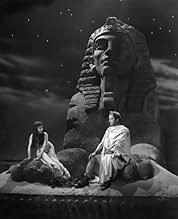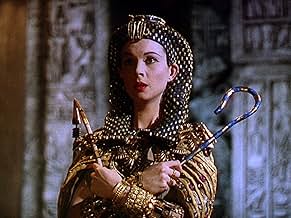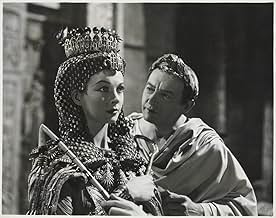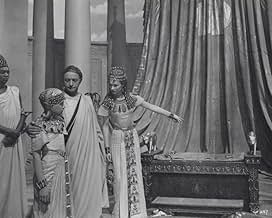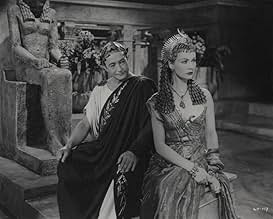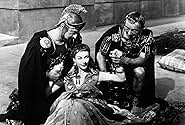IMDb RATING
6.2/10
3.3K
YOUR RATING
At the height of the Roman Civil War, a young Cleopatra (Vivien Leigh) meets a middle-aged Julius Caesar (Claude Rains), who teaches her how to rule Egypt.At the height of the Roman Civil War, a young Cleopatra (Vivien Leigh) meets a middle-aged Julius Caesar (Claude Rains), who teaches her how to rule Egypt.At the height of the Roman Civil War, a young Cleopatra (Vivien Leigh) meets a middle-aged Julius Caesar (Claude Rains), who teaches her how to rule Egypt.
- Nominated for 1 Oscar
- 2 nominations total
Anthony Eustrel
- Achillas
- (as Antony Eustrel)
James McKechnie
- 2nd. Centurion
- (as James Mc Kechnie)
Featured reviews
Shaw was a wonderful historian with a deadly eye for irony. Claude Rains brings off Caesar with withering poise and breezy wit, standing tall above the flashing eye of an Egyptian hurricane named Cleopatra (Vivien Leigh). Caesar's aide-de-camp is an affable bear of a man named Rufio (Basil Sydney), who mainly just keeps his eye on Caesar. Cleopatra is likewise sheltered by her scheming counselor Ftatateeta (Flora Robson), a name that not even Caesar can pronounce. Character actor Cecil Parker as Britannus adds quaintness and serendipity to an already splendid alchemy of spotty characters. The film moves by turns through a narrow skein of classical history as the reliquarian Egyptian world gives way to a streamlined Roman one. Along the way, we witness the contending parties encompassed and entangled in a delightful pantheon of wit, irony, satire, morals, manners, and adventure. Overall, a tremendously facile projection of one of England's sharpest satirical voices, G.B. Shaw.
Enjoyed seeing this great film classic from the Year 1945 with a fantastic cast of great veteran actors and stars who were just starting their careers. Claude Rains played the role as Julius Caesar who in this film was a wise old fox who is very forgiving for many reasons and stumbles upon Cleopatra, (Viven Leigh) in the desert and she does not know that he is Julius Caesar. Caesar charms Cleopatra and they become good friends, and Caesar teaches her how to rule her country of Egypt and tries to solve her problems with her servants and mostly her brother who wants to be king and ruler. There is plenty of comedy in this film which surprised me, because I had no idea it is really a film loaded with funny scenes and excellent acting by the entire cast. Stewart Granger gave a great supporting role along with Michael Rennie. If you look close you will see Jean Simmons playing as a harpist who later on in real life married Stewart Granger. Lots of fun to view this film from the past. Enjoy
Up to the time it was released in 1945 Caesar and Cleopatra was the most expensive British film ever made. It was as though the British cinema was trying to show America it could do a DeMille like epic as good as Cecil B. DeMille or anyone else from Hollywood. It may have been a little too overdone. Director Gabriel Pascal might have gotten a bit carried away with the spectacle and the audience might well have missed some of George Bernard Shaw's inspired dialog.
And Pascal had the advantage of the aged Mr. Shaw personally supervising the production. Of course Shaw insisted on total fidelity to his play and the ideas therein. I understand that J. Arthur Rank wanted to have a little sex and romance in there, like DeMille did do, but Shaw would have none of it.
What sets Caesar and Cleopatra apart from other Cleopatra stories that starred Theda Bara, Elizabeth Taylor, and Claudette Colbert is that Shaw portrayed her as probably what she was, a silly teenager who just happens to be Queen of Egypt. There's a little bit of Scarlett O'Hara in Vivien Leigh's performance as she moves from silly teen to a young women well schooled in statecraft by Julius Caesar.
Claude Rains plays a world weary Julius Caesar and the Shavian quips roll off his tongue with great aplomb. Like George Bernard Shaw's other masterpiece Pygmalion, Rains tutors Leigh and the results far exceed what he could have hoped for.
Production on Caesar and Cleopatra was begun while there was still a shooting war in Europe and V-2s and other such explosive devices were still raining down on the United Kingdom. A couple came real close to the studio in London this was being filmed at.
Stewart Granger got his first real notice in this film playing Apollodorus and Francis L. Sullivan plays a blustering and plotting Pothinos. If you look hard among the various slave women you will find both Jean Simmons and Kay Kendall among the extras.
You will also like both Basil Sydney as Ruffio and Cecil Parker as Britanus, two aides to Caesar who both occasionally give him a reality check.
Caesar and Cleopatra failed to recoup the cost of making it in initial release. J. Arthur Rank misjudged the British public taste post World War II. Maybe a little less expense and more attention to Shaw's words and the film might have been better.
Still it's pretty good as is.
And Pascal had the advantage of the aged Mr. Shaw personally supervising the production. Of course Shaw insisted on total fidelity to his play and the ideas therein. I understand that J. Arthur Rank wanted to have a little sex and romance in there, like DeMille did do, but Shaw would have none of it.
What sets Caesar and Cleopatra apart from other Cleopatra stories that starred Theda Bara, Elizabeth Taylor, and Claudette Colbert is that Shaw portrayed her as probably what she was, a silly teenager who just happens to be Queen of Egypt. There's a little bit of Scarlett O'Hara in Vivien Leigh's performance as she moves from silly teen to a young women well schooled in statecraft by Julius Caesar.
Claude Rains plays a world weary Julius Caesar and the Shavian quips roll off his tongue with great aplomb. Like George Bernard Shaw's other masterpiece Pygmalion, Rains tutors Leigh and the results far exceed what he could have hoped for.
Production on Caesar and Cleopatra was begun while there was still a shooting war in Europe and V-2s and other such explosive devices were still raining down on the United Kingdom. A couple came real close to the studio in London this was being filmed at.
Stewart Granger got his first real notice in this film playing Apollodorus and Francis L. Sullivan plays a blustering and plotting Pothinos. If you look hard among the various slave women you will find both Jean Simmons and Kay Kendall among the extras.
You will also like both Basil Sydney as Ruffio and Cecil Parker as Britanus, two aides to Caesar who both occasionally give him a reality check.
Caesar and Cleopatra failed to recoup the cost of making it in initial release. J. Arthur Rank misjudged the British public taste post World War II. Maybe a little less expense and more attention to Shaw's words and the film might have been better.
Still it's pretty good as is.
Bernard Shaw does not perhaps adapt too well to the screen, but, in my opinion, this adaptation is particularly successful and probably the best of them all, although one video edition in the UK didn't even risk mentioning Shaw's name anywhere on the box, prefering to market it as mere exotic spectacle. It is of course all that, but as with everything Shaw wrote, much, much more, and is essentially about IDEAS, (not necessarily, as has often been contended, always Shaw's own personal convictions). Vivien Leigh as Cleopatra gives yet another sublime and first-rate performance as she progresses from frightened teenager to an imperious Queen with a real understanding of power. (The scene in which she whips a hapless slave in order to experience the "thrill" of total power, strangely pre-echoes the psychology of the much misunderstood SALO). Mention too must also be made of the superb musical score by Georges Auric, and admiration expressed for the sheer audacity of producer Pascal for making such a lavish and expensive production in poverty-stricken post-war Britain. Well worth watching.
Shaw's hardly a speck on the windshield of American cultural consciousness anymore. Too bad. "The Devil's Disciple," "Major Barbara," "Arms and the Man," "Candida," "You Never Can Tell." Witty, clever, insightful, intriguing... a century and more later.
For those who haven't discovered him yet, this colorful, fast-paced rendition of "C&C" makes a nifty portal. The film -looks- like "Quo Vadis" or "Samson and Delilah" (of more or less the same vintage). It even looks like the Taylor-Burton-Harrison marathon done almost two decades later.
But it doesn't -feel- like -any- of those. Shaw always had a great story to tell -- and a something worthwhile to -say- -- and he (or his characters) almost invariably told and said it well. One could hardly call the 1934 or 1963 films "insightful romps." This, however...
I've been a sucker for Vivien Leigh since I watched her whip the boys into shape in "GWTW," but as interesting as she was there, she's miles beyond Scarlet O'Hara here. Shaw gave -his- Cleo a far more complex character than Young or Mankiewicz gave their Cleo's; this alabaster Leigh is both adolescent and guileful. But to Rains's conflicted but self-suspect Caesar, she's about as transparent as that look-alike, late-night, hottie-cum-biblical-scholar who inherited Gene Scott's TV ministry.
The relationships here are no different from those in the Mankiewicz mess, but they move along in far more sophisticated -- and entertaining -- fashion here. We already know the resolution, it's the unfolding of the drama that matters.
Rains ("Casablanca," "The Invisible Man") and Leigh bring the wise, amused, self-effacing old man and the desperate, manipulative, narcissistic young woman in Shaw's play far more credibly to life than was the case in the DeMille or Manciewicz films. And supporters like Robson, Granger and the rest add plenty. But as in any Shaw play, it's the playwright's sophisticated revelations that matter.
The "big success" narcissist who thinks a "trophy wife" is a good idea might learn plenty from a trip to Blockbuster and a two-dollar investment.
For those who haven't discovered him yet, this colorful, fast-paced rendition of "C&C" makes a nifty portal. The film -looks- like "Quo Vadis" or "Samson and Delilah" (of more or less the same vintage). It even looks like the Taylor-Burton-Harrison marathon done almost two decades later.
But it doesn't -feel- like -any- of those. Shaw always had a great story to tell -- and a something worthwhile to -say- -- and he (or his characters) almost invariably told and said it well. One could hardly call the 1934 or 1963 films "insightful romps." This, however...
I've been a sucker for Vivien Leigh since I watched her whip the boys into shape in "GWTW," but as interesting as she was there, she's miles beyond Scarlet O'Hara here. Shaw gave -his- Cleo a far more complex character than Young or Mankiewicz gave their Cleo's; this alabaster Leigh is both adolescent and guileful. But to Rains's conflicted but self-suspect Caesar, she's about as transparent as that look-alike, late-night, hottie-cum-biblical-scholar who inherited Gene Scott's TV ministry.
The relationships here are no different from those in the Mankiewicz mess, but they move along in far more sophisticated -- and entertaining -- fashion here. We already know the resolution, it's the unfolding of the drama that matters.
Rains ("Casablanca," "The Invisible Man") and Leigh bring the wise, amused, self-effacing old man and the desperate, manipulative, narcissistic young woman in Shaw's play far more credibly to life than was the case in the DeMille or Manciewicz films. And supporters like Robson, Granger and the rest add plenty. But as in any Shaw play, it's the playwright's sophisticated revelations that matter.
The "big success" narcissist who thinks a "trophy wife" is a good idea might learn plenty from a trip to Blockbuster and a two-dollar investment.
Did you know
- TriviaThe role of Caesar originally was offered to Sir John Gielgud, who turned it down because he detested Director Gabriel Pascal.
- GoofsCaesar refers to his nose as "rather long" and "a Roman nose," but the idea of a "Roman nose" was not introduced until almost 150 years later, when the Emperor Hadrian erected statues of his favorite, Antinous, throughout the Empire (where many of the people had never seen a Roman), and Antinous's long nose was taken as typical of Romans (even though Antinous was a Greek).
- Quotes
Julius Caesar: And so to the end of history, murder shall breed murder, always in the name of right, and justice, and peace, until the gods create a race of men that can understand.
- Crazy creditsClosing credits cast list finishes with And The Crowd.
- ConnectionsFeatured in Great Performances: Laurence Olivier: A Life (1983)
- How long is Caesar and Cleopatra?Powered by Alexa
Details
Box office
- Budget
- £1,278,000 (estimated)
- Runtime2 hours 18 minutes
- Aspect ratio
- 1.37 : 1
Contribute to this page
Suggest an edit or add missing content



